Embarking on the classic Everest Base Camp hike is a truly remarkable journey that captivates the hearts and minds of adventurous travelers worldwide. This breathtaking 21-day trek not only offers a chance to witness the majestic peaks of the Himalayas but also immerses participants in the rich cultural heritage of the Sherpa people. With expert guidance, necessary permits, and comfortable teahouse accommodations, the experience promises to be both exhilarating and immersive. However, the true allure of this trek lies in the personal transformation that awaits those who dare to venture beyond the beaten path.
Key Points
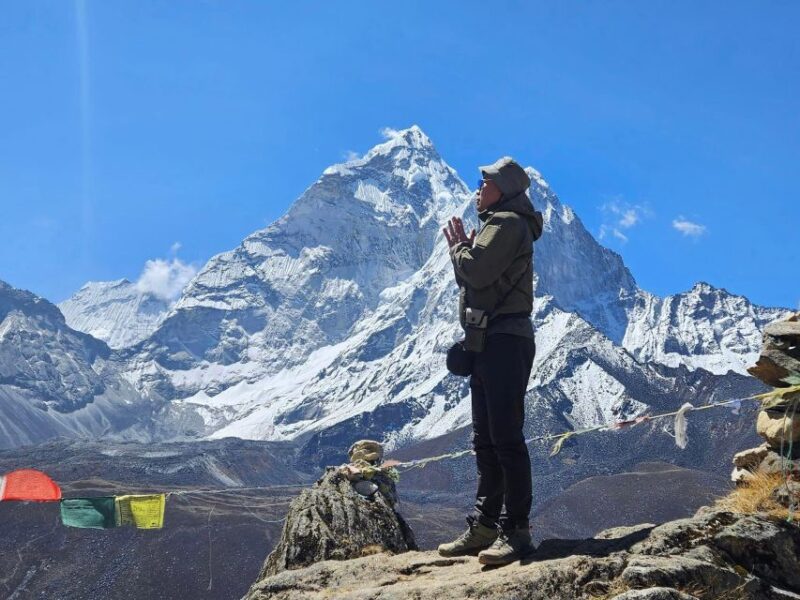
- The classic Everest Base Camp hike is a 21-day trek that takes trekkers from Kathmandu to an elevation of 5,364m at Everest Base Camp.
- The trek is priced from $2,000 per person and includes a guide, permits, and coverage for transportation, accommodation, and domestic flights.
- Trekkers can enjoy Sherpa culture, explore ancient Buddhist temples, and witness the breathtaking views from Kalapatthar (5,545m).
- Proper preparation, including a comprehensive medical examination, fitness regimen, and high-quality trekking gear, is essential for this challenging trek.
- The trek offers a unique cultural experience and the opportunity to witness the majesty of the Himalayas, though considerations such as altitude sickness and environmental hazards must be carefully managed.
Overview of the Trek
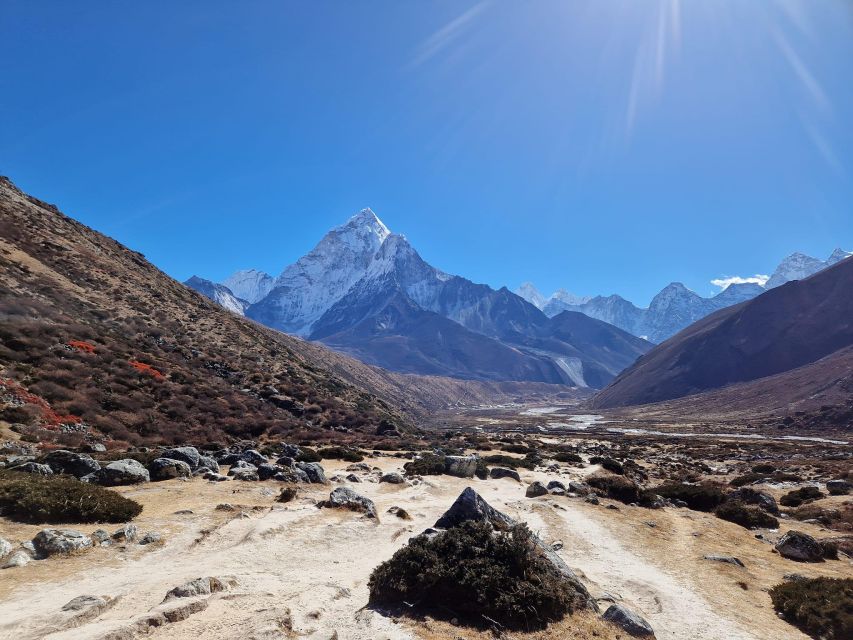
The classic Everest Base Camp hike is a renowned 21-day adventure that takes trekkers on an iconic journey through the heart of the Himalayas, offering stunning mountain vistas and an immersive cultural experience.
Priced from $2,000 per person, this private group tour includes a live English-speaking guide, essential permits, and comfortable teahouse accommodations along the way.
Trekkers can take advantage of the free cancellation policy up to 24 hours in advance and the reserve now, pay later option.
The trek covers a range of elevations, from 1,520 meters to the Everest Base Camp at 5,364 meters, with rest days built in to aid acclimatization.
Adventurers can look forward to encountering rich Sherpa culture and breathtaking panoramas from the Kalapatthar viewpoint.
Ready to hit more trails? More hiking adventures we feature in Pheriche Nepal
Itinerary Highlights
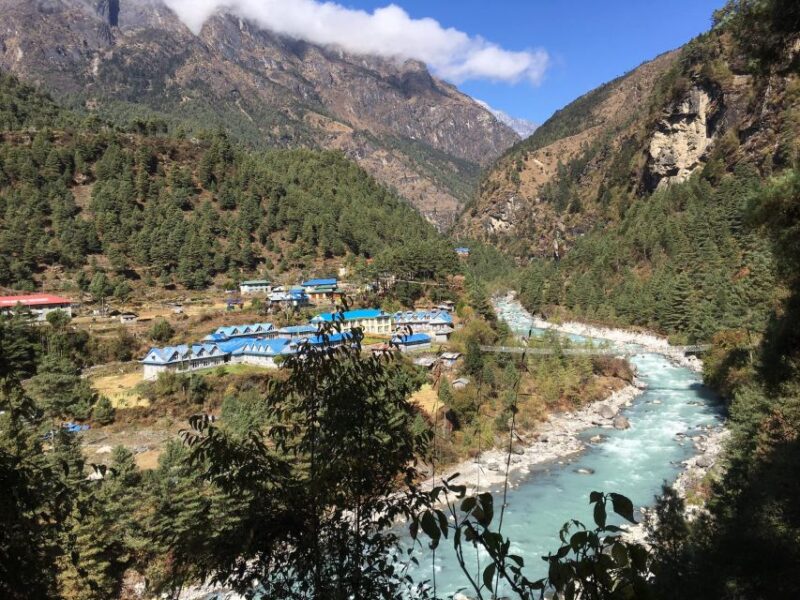
The Everest Base Camp trek follows an immersive itinerary, beginning with arrival in Kathmandu where travelers embark on a sightseeing tour of the city’s UNESCO-listed landmarks.
The journey then continues with a drive to Bhandara (1,520m), followed by trekking through picturesque Sherpa villages like Sete (2,500m), Junbesi (2,675m), and the lively Namche Bazaar (3,440m).
Vital acclimatization and rest days are scheduled at Dingboche before the team treks to the iconic Everest Base Camp (5,364m) and Kalapatthar (5,545m) viewpoint for breathtaking panoramas.
After this unforgettable adventure, the trek concludes with a departure from Nepal.
-
Arrive in Kathmandu for sightseeing
-
Drive to Bhandara and trek through Sherpa villages
-
Acclimatize and rest at Dingboche
-
Reach Everest Base Camp and Kalapatthar viewpoint
Cultural Exploration
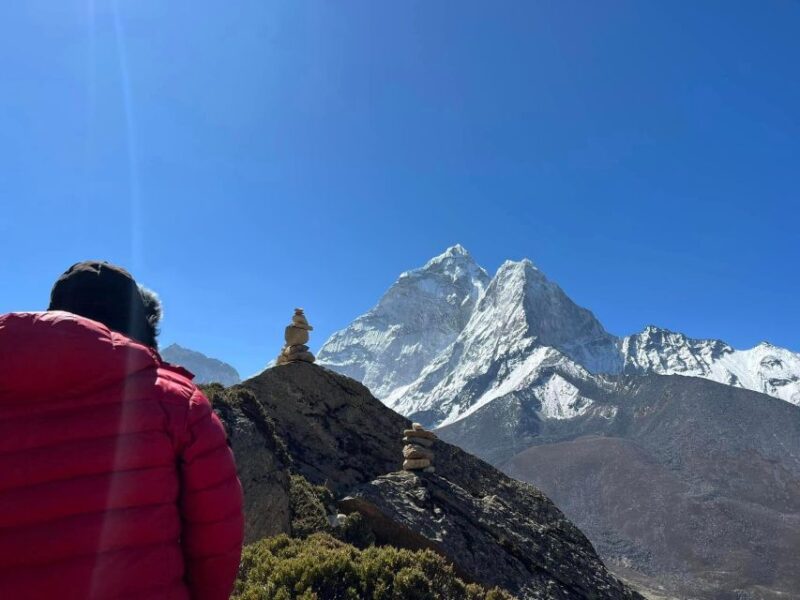
Along the Everest Base Camp trek, adventurers enjoy the rich Sherpa culture, encountering vibrant villages, sacred monasteries, and time-honored traditions.
The Sherpa people, renowned for their mountaineering expertise, welcome trekkers with warm hospitality and a deep reverence for the land. Visitors can explore ancient Buddhist temples, witness traditional dance performances, and gain insights into the Sherpa way of life.
The trek offers a unique opportunity to learn about the Sherpa’s spiritual connection to the Himalayas and their resilience in the face of the region’s harsh environment.
This cultural experience adds a profound dimension to the iconic Everest adventure, leaving trekkers with a deeper appreciation for the local communities who call these mountains home.
Inclusions and Services
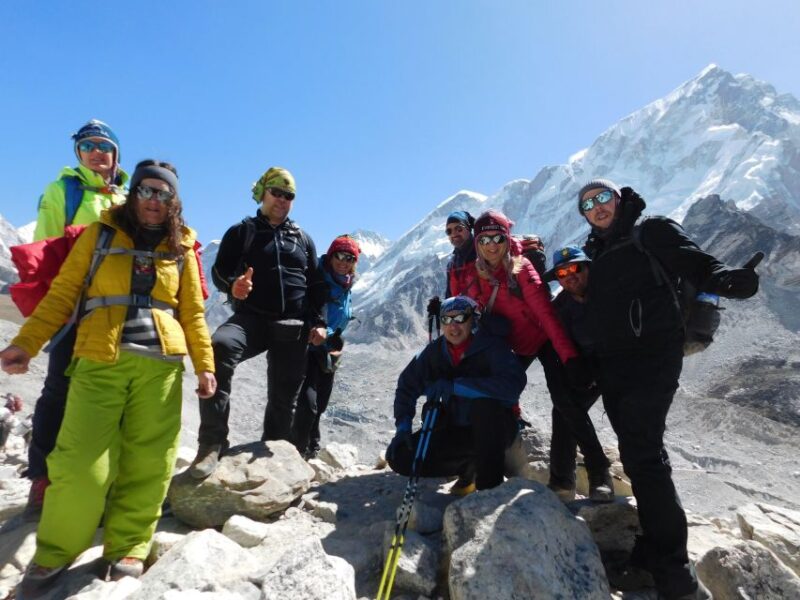
To ensure a seamless Everest Base Camp trekking experience, the tour package includes an array of essential services and amenities.
Travelers enjoy private vehicle transfers for airport and hotel transportation, along with 3 nights of 3-star hotel accommodation in Kathmandu with breakfast.
Plus, the package covers necessary trekking permits, one-way domestic flights, and 17 nights of teahouse lodging during the trek.
Other inclusions are:
-
Experienced trekking guide and emergency helicopter rescue service
-
Adventure certificate upon trip completion
-
First aid medical kit, rain protection duffel bags, and sleeping bags
-
Cultural farewell dinner
This comprehensive offering give you a worry-free journey, allowing travelers to focus on the breathtaking adventure ahead.
More Great Tours NearbyRestrictions and Considerations
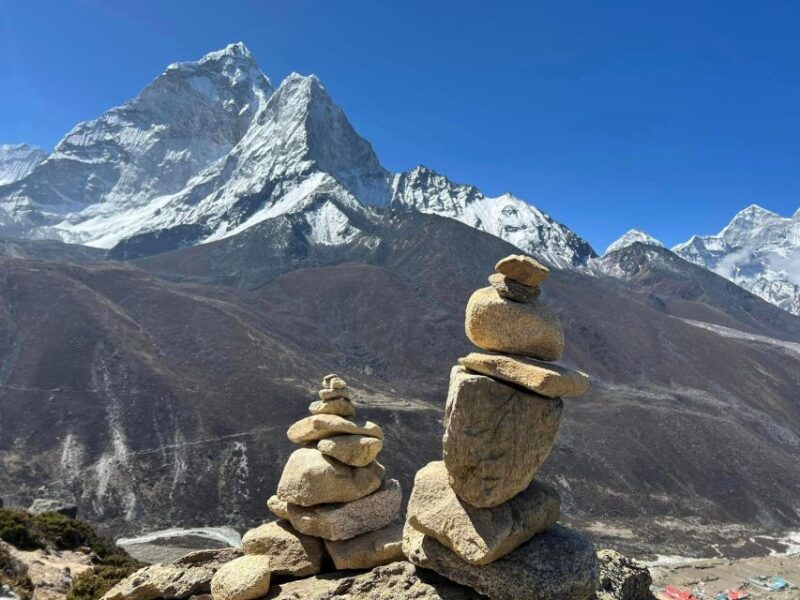
While the Everest Base Camp trek offers an unparalleled adventure, certain restrictions and considerations apply to ensure the safety and well-being of participants.
Pregnant women, individuals with heart or kidney problems, wheelchair users, the visually impaired, and those exceeding specific weight and age limits are generally not recommended to undertake this challenging trek.
Additional costs may also arise, such as hiring porters or securing extra nights in Lukla if flights are canceled due to unfavorable weather conditions.
On top of that, tips for guides and porters aren’t included in the package price, and visitors should budget accordingly for these optional gratuities.
The journey’s inherent cultural and scenic rewards often outweigh these practical concerns for adventurous trekkers.
Planning and Preparation
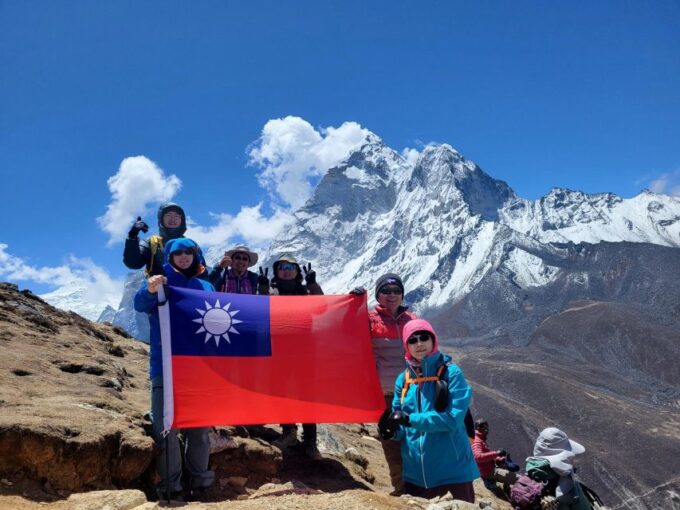
Proper planning and thorough preparation are key to ensuring a successful and safe Everest Base Camp hike.
Trekkers must carefully consider their fitness level, acclimatization needs, and the necessary gear and equipment required for navigating the challenging terrain and variable weather conditions throughout the journey.
Prospective hikers should:
-
Undergo a comprehensive medical examination and training regimen to build endurance and strength.
-
Familiarize themselves with the itinerary, acclimatization schedule, and emergency protocols.
-
Acquire high-quality trekking gear, including proper footwear, layered clothing, and necessary accessories like headlamps and trekking poles.
-
Obtain essential permits and travel documentation well in advance to avoid delays.
Health and Safety
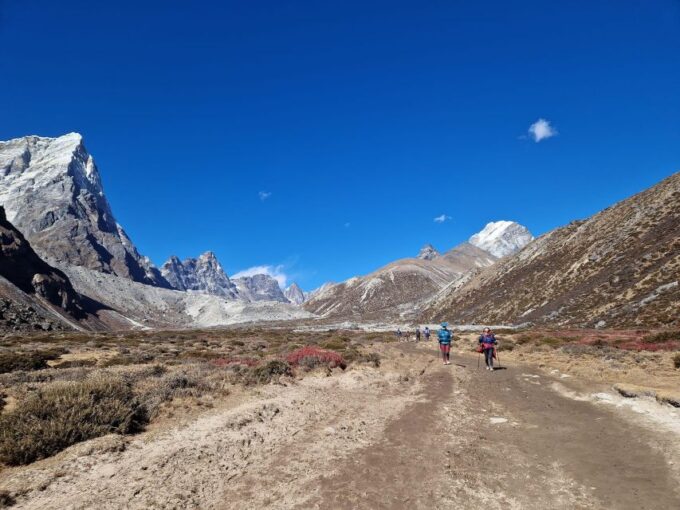
Trekking to Everest Base Camp poses unique health and safety challenges that require proactive planning and precautions.
Altitude sickness, exhaustion, and environmental hazards can jeopardize the experience if not managed effectively. Climbers must acclimatize gradually, staying hydrated and resting adequately.
Proper gear, including layers and sturdy footwear, is essential to withstand the cold, wind, and snow. Porters and guides are trained to monitor trekkers’ well-being and provide first aid if needed.
Emergency helicopter evacuation services are available in case of serious medical emergencies.
Booking and Pricing
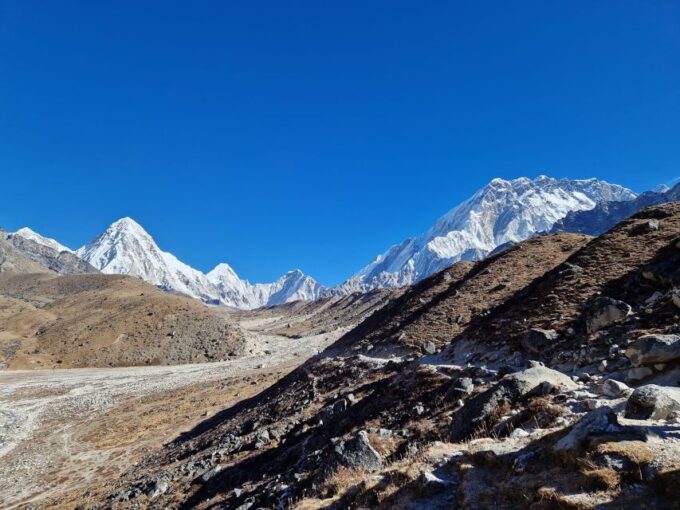
The classic Everest Base Camp hike offers a range of booking and pricing options to suit various budgets and preferences.
Travelers can choose from a starting price of $2,000 per person, with the flexibility to reserve their spot now and pay later. Plus, the tour provider allows free cancellation up to 24 hours in advance for a full refund, providing peace of mind for last-minute changes in plans.
The package includes:
-
Private vehicle transfers for airport and hotel
-
3 nights’ accommodation in Kathmandu with breakfast
-
One-way domestic flights and essential trekking permits
-
17 nights’ teahouse accommodation during the trek
These comprehensive inclusions ensure a seamless and enjoyable experience for adventurers embarking on the iconic Everest Base Camp journey.
Frequently Asked Questions
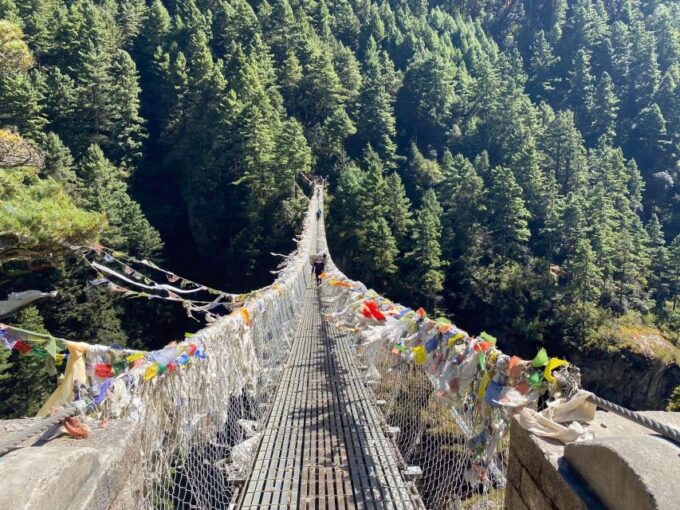
What Is the Average Group Size for the Hike?
The average group size for this hike is typically small, allowing for a more personalized and intimate trekking experience. Most groups range from 4 to 8 participants, offering a private group adventure.
Can I Extend the Trek Duration if Needed?
Yes, the trek duration can typically be extended if needed. Hikers can discuss options with the tour operator to customize their itinerary and stay longer along the trail to accommodate their preferences or acclimatization requirements.
Are There Any Specific Training Requirements for the Hike?
Yes, specific training is recommended for the Everest Base Camp hike. Participants should focus on improving cardiovascular fitness, building leg and core strength, and practicing hiking with a backpack to prepare for the challenging terrain and high altitudes.
Can I Make Changes to the Itinerary During the Trek?
Travelers can typically make minor changes to the itinerary during the trek, such as adjusting the pace or adding short side excursions. However, substantial changes may require coordination with the guide and could incur additional costs.
What Is the Best Time of Year to Do the Everest Base Camp Hike?
The best time of year to do the Everest Base Camp hike is typically during the spring (April to May) or autumn (September to November) seasons. These periods offer the most favorable weather conditions and clear mountain views for trekkers.
Recap
The Classic Everest Base Camp Hike offers adventurers an unparalleled opportunity to enjoy the majestic landscapes and rich cultural heritage of the Everest region.
With expert guidance, essential permits, and comfortable accommodations, this 21-day trek provides a comprehensive and unforgettable experience for those seeking to challenge themselves and witness the grandeur of the world’s highest mountain.
You can check availability for your dates here: